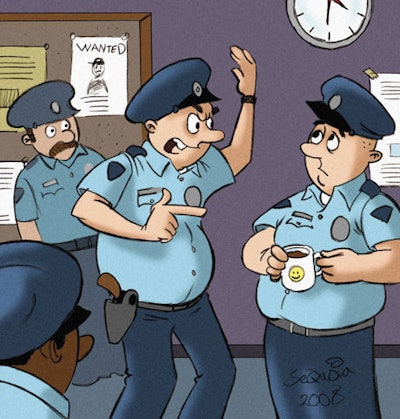 Illustration: Sequoia Blankenship
Illustration: Sequoia Blankenship
History will be kind to me for I intend to write it. - Sir Winston Churchill
I have written many times about what a great life law enforcement offers and how it also gives us plenty to talk about. Each of you has a collection of unique and exciting adventures brought to you courtesy of your local criminal element, confused citizens, or the elements of nature.
My stories often involve things I did with other cops. So from time to time I hear from some of the men and women whom I refer to in my various columns.
Mostly they want to point out some detail I failed to note or remind me of someone else who was there. But sometimes they aren't thrilled with what I wrote. For example, one of my closest friends who is now a chief felt a little uncomfortable explaining to his folks why we did what I said we did. The great thing about being the storyteller is you control the reveal, the pace, the embarrassment. I have made so many mistakes that it has created a kaleidoscope of learning points as well as morality plays. I hope that by telling them to you that I am giving you the ability to avoid them.
Whenever someone asks what they should do in this or that situation, I am usually comfortable telling them I am not real sure what they should do. But there's one thing I'm certain about: What they shouldn't do, since I've probably already done it!
Nothing beats experience, and experience does a lot of beating back. That's the great part about human learning: You can learn from the experiences of others and avoid the consequences of going mano a mano with experience.
Obviously, I really want you to read my experiences and stories. But the point of this little narrative is to encourage you to start telling your stories whenever you are in a position to help others learn.
Too many cops think that training only occurs in the classroom, on the range, or on the mat, and that just isn't so. Anything that changes your long-term behavior is training, good or bad. If it changes the way you do business, then it's training. It just happens that storytelling is one of the most powerful forms of educating and training; we are literally hard-wired to learn from someone telling us a story.
I like to tell my stories since I know exactly what I did wrong and if I let someone else tell them they might make me look even more foolish than I really was. I also enjoy laughing at myself and find it good therapy for those times I think I'm either too smart, too cool, or too anything else and need to come down a peg or two.
Just a pointer, though, about telling "war stories" about yourself; share your mistakes and what you learned, otherwise you are just telling a story about you and not teaching.
My younger son loves to tell us about whatever he did recently and he does it in very dramatic and entertaining fashion. Once when he was asked by a family member why he always talks about himself when he tells his many stories, he looked absolutely flabbergasted as he emphatically pronounced, "But you guys, I'm always in the story."
My son is right about one thing: Of all the stories we tell, the best ones are the ones we actually lived. So when you tell the history of a critical incident or an exciting call to others, you can help them see how they can stay safer and learn from your mistakes but only if you are willing to admit your mistakes.
That, my friends, is why I like to be the one telling the story, making you smile, explaining what I did, and, hopefully, controlling the damage to my history.

















